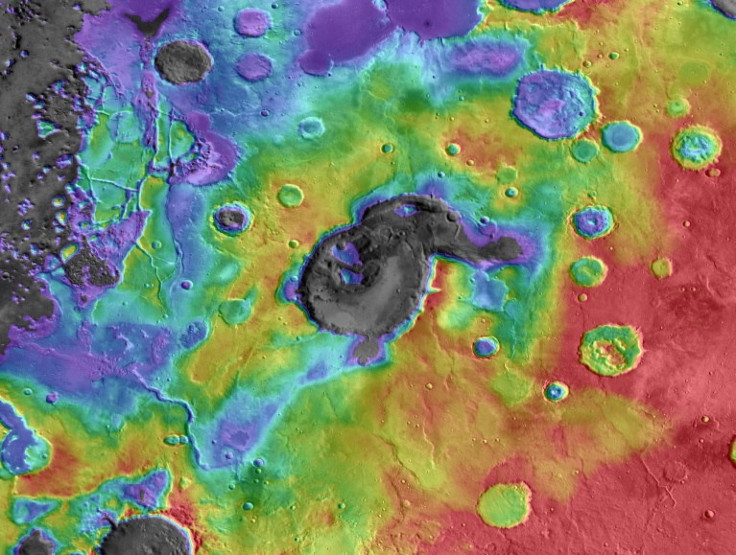Ancient Supervolcano On Mars: Researchers Discover Crater May Be The Remains Of A Massive Eruption
Researchers believe a crater may actually be the remains of an ancient supervolcano. The impact basin does not have many features typically associated with a crater but does feature signs of ancient volcanism.

The study was led by Joseph R. Michalski, from the Planetary Science Institute, and co-author Jacob E. Bleacher, from the NASA Goddard Space Flight Center, and used data collected by NASA and European Space Agency spacecraft.Topographical data of a crater known as Eden Patera on Mars from NASA's Mars Odyssey, Mars Global Surveyor and Mars Reconnaissance Orbiter as well as ESA's Mars Explorer revealed an impact crater that looked more like the remains of a volcanic caldera, or depression caused by a collapse of land following an eruption.
A supervolcano is classified as an eruption that ejects more than 1,000 cubic kilometers of rock, ash and magma. On Earth there have been a few such eruptions including the Yellowstone caldera and the Toba caldera, located in Northern Sumatra, Indonesia.
According to Michalski, researchers use a set of distinct features to identify young volcanoes on Mars but ancient volcanoes on Mars are something of a mystery. Michalski said in a statement, "The long-standing question has been what ancient volcanoes on Mars look like. Perhaps they look like this one." If Eden Patera is a volcano it would be the first found in the Arabia Terra region of Mars. Arabia Terra is a heavily cratered region and Eden Patera would have been just another impact basin. Michalski said Eden Patera did not have a raised rim nor was there evidence of ejected material and melted rock that would be caused by such an impact. A supervolcano would be a magnitude 8 eruption on the Volcano Explosivity Index, for a comparison Mount St. Helens was a magnitude 5 eruption.
Bleacher provided further analysis of Eden Patera and discovered signs of ancient volcanic activity. Bleacher found evidence of rock ledges caused by a lava lake draining out while the outside of the basin "is ringed by the kinds of faults and valleys that occur when the ground collapses because of activity below the surface."
If Eden Patera is the remains of an ancient supervolcano, the eruption would have had a huge impact on the climate and atmosphere of Mars. "During these types of eruptions on Earth, the debris may spread so far through the atmosphere and remain so long that it alters the global temperature for years," said Bleacher. The researchers also discovered other candidate volcanoes near Eden Patera.
© Copyright IBTimes 2024. All rights reserved.






















